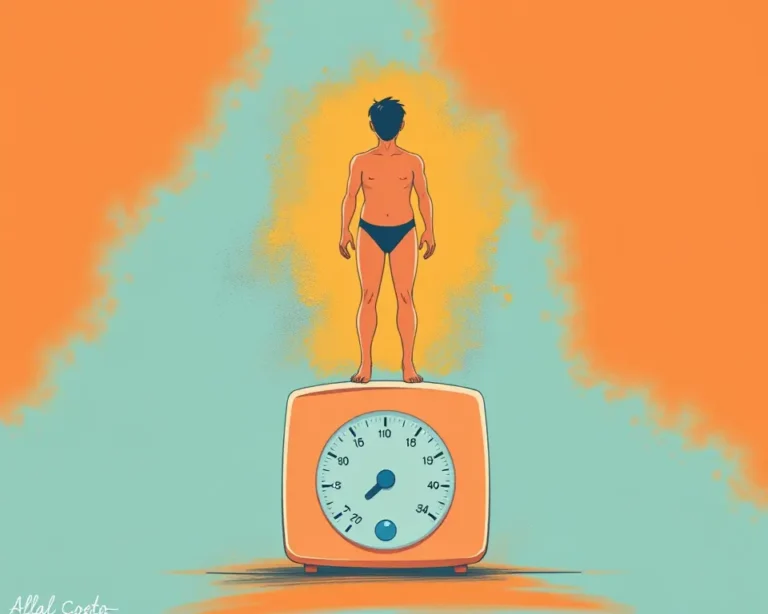Many people find themselves in a frustrating situation: diligently following a diet plan, yet the scale refuses to budge. Leon Bolmeer, a personal trainer and owner of Geezers Boxing, sheds light on this common problem, explaining why a calorie deficit alone isn’t always enough for weight loss and offering actionable solutions. It’s important to remember that everyone’s body is different, and what works for one person might not work for another.
The Calorie Deficit Myth: Why It’s Not Always Enough
While a calorie deficit – consuming fewer calories than you burn – is fundamental to weight loss, it’s not the only factor at play. Bolmeer emphasizes that simply cutting calories without considering other aspects of your diet and lifestyle can hinder your progress.
The Importance of Macronutrients and Fiber
Bolmeer stresses the significance of a balanced diet, highlighting the roles of fiber and protein.
- Fiber-rich foods: Incorporating fruits, vegetables, and whole grains into your meals promotes satiety, helping you feel fuller for longer and preventing overeating.
- Protein: Adequate protein intake is crucial for preserving muscle mass during weight loss, which in turn supports your metabolism.
The Hidden Sugars Sabotaging Your Diet
Added sugars in processed foods and sugary drinks can quickly derail your weight loss efforts. Bolmeer advises opting for plain, unsweetened versions of products like yogurt and milk and avoiding sugary beverages, which provide empty calories without nutritional value.
Lifestyle Factors Impacting Weight Loss
Beyond diet, several lifestyle factors can significantly influence your ability to lose weight, even when maintaining a calorie deficit.
The Sleep Connection
According to Bolmeer, “For those not seeing results despite maintaining a calorie deficit, consider other factors like sleep. Poor sleep can disrupt hormones that regulate hunger and fullness, making it harder to lose weight.” Aim for consistent, quality sleep to regulate hormones and support your weight loss goals.
Stress and Cortisol Levels
Stress can lead to elevated cortisol levels, which can shift your metabolism to store fat. It also increases appetite and can cause cravings for sweet, fatty and salty foods. Managing stress through techniques like meditation, yoga, or spending time in nature can help regulate cortisol and reduce cravings.
The Role of Exercise
While diet plays a more significant role in weight loss, exercise is crucial for overall health and can aid in weight management.
- Strength training: Incorporating strength-based exercises helps preserve muscle mass, which boosts your metabolism and helps you burn more calories at rest.
- Varied routine: Doing the same workouts over and over may cause your body to hit a plateau. It’s important to push your body out of its comfort zone by changing up routines, increasing repetitions or the number of sets in your workout.
The Impact of Snacking
Mindless snacking can easily add extra calories to your daily intake. To snack smart, Bolmeer recommends:
- Looking up the nutrition information for your snacks, so you know what you’re eating.
- Avoiding products that contain artificial sweeteners.
- Eating fresh fruits and vegetables whenever possible. If you’re not a big fan of fruits and vegetables, you can pair them with something tasty like hummus or a handful of nuts.
Medical Reasons for Weight Loss Resistance
Sometimes, underlying medical conditions can make weight loss challenging despite your best efforts.
Insulin Resistance
Insulin resistance is a condition where the cells in your body stop responding to insulin, causing high levels of sugar in your blood. This extra blood sugar will be stored as fat instead of as an energy source called glycogen, making it more challenging to lose weight. Regular exercise and an active lifestyle can help combat insulin resistance.
Thyroid Issues
A sluggish thyroid can also hinder weight loss. If you suspect a thyroid problem, consult your doctor for testing and treatment.
The Set Point Theory
The set point theory suggests that your body has a predetermined weight range that it tries to maintain. As you attempt to lose weight, your body may fight back by releasing hormones that increase hunger and decrease feelings of fullness. However, incorporating strength training and managing stress can help lower your set point over time.
Common Weight Loss Mistakes
Several common mistakes can sabotage your weight loss efforts, even if you’re dieting.
Over-Restriction
Excessive calorie restriction can backfire, lowering your metabolism and leading to muscle loss rather than fat loss. It can also trigger strong cravings and make it harder to stick to your diet in the long run.
Focusing on Elimination and Restriction
Instead of focusing on what you need to eliminate, focus on balancing your meals with plenty of protein, fiber and foods you enjoy eating.
Skipping Meals
Skipping meals often leads to intense hunger and cravings, which may cause compulsive eating, eating too quickly or eating more than what feels good to your body.
Expecting Too Much Too Soon
It can take time to unlearn habits and lose weight. To keep the weight from coming back you need to make changes you can stick with in the long run.
Drinking Too Many Calories
Across a day the sugar in drinks like soft drinks, fruit juices and in tea or coffee can easily add up to the equivalent of extra calories.
Rewarding Workouts with Food
Even if you get enough activity, you can gain an extra pound or two if you tend to eat fast food or sugary snacks or sodas.
Strategies for Sustainable Weight Loss
Sustainable weight loss is a gradual process that involves making long-term lifestyle changes.
Gradual Improvements
Focus on gradual improvements rather than quick fixes, as these often lead to better long-term success. Aim for a safe target of one to two pounds per week.
Personalization
Caloric needs vary based on age, weight, height, metabolism, and activity levels. Personalize your plan rather than copying others.
Be Patient
Weight loss is a steady process, not an overnight change. Be patient with your body and focus on gradual improvements rather than quick fixes, as these often lead to better long-term success.
Medical Supervision
If you’re struggling with your weight loss despite exercising and eating a balanced diet, you may want to talk with your doctor about medical weight loss.







